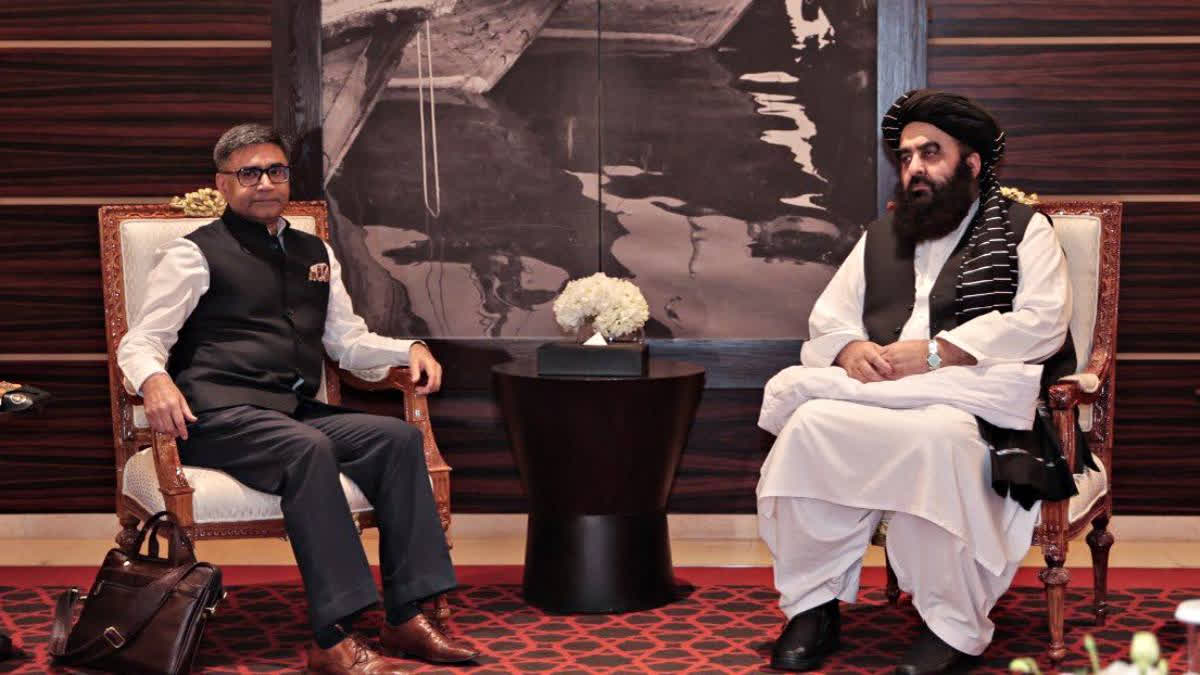New Delhi: The recent meeting between the Indian foreign secretary, Vikram Misri, and the Afghanistan Acting Foreign Minister, Mawlawi Amir Khan Muttaqi, in Dubai, is the latest in the changing scenario in South Asia. The landscape began to change with the overthrowing of the Sheikh Hasina regime in Bangladesh in August last year. Since then, despite Bangladesh requesting India for rice and continued support, it has begun gravitating towards Pakistan.
Import of ammunition and foodgrains from Pakistan as well as the forthcoming visit of the Pak foreign minister, Ishaq Dar, to Bangladesh, is indicative of the changing scenario in the region. Ishaq Dar mentioned that Bangladesh is Pakistan’s ‘lost brother.’ This visit follows a series of meetings between the Bangladesh interim government leader, Mohamad Yunus, and Pakistan’s PM, Shehbaz Sharief, where both have attempted to reignite ties.
Yunus’s regular demand for re-invigorating SAARC has come as a damper to New Delhi. India ignores this demand from Yunus while continuing to engage with Dacca hoping to re-set ties.
There are also reports that military-to-military cooperation between Pakistan and Bangladesh is on the rise. Inputs mention that Bangladesh is considering purchasing Abdali short-range ballistic missiles from Pakistan and tanks from Turkey as a deterrent against India.
In addition, commencing from Feb this year, the Pakistan army would commence training Bangladesh forces. The training would be conducted in four Bangladesh cantonments. The Pakistan team would be headed by a major general rank officer.
While training by Pak troops is not a major concern for India what remains a worry is the increased radicalization which Pakistan would indulge in. Added would be the anti-India content in the agenda, pushing Indo-Bangladesh military relations into unchartered territory. Bangladesh has no threat other than India. With the entry of Pakistan into the country, China would soon follow. This would be an added concern.
Further, this would open doors for Pakistan’s ISI to gain a foothold to re-establish bases to train anti-India insurgent groups in the country. It had been doing so earlier. Bangladesh could also become a conduit for moving Kashmiri militants into India. Unconfirmed reports mention that this has already begun.
The meeting between the Indian foreign secretary and the Afghanistan-acting foreign minister was a means of conveying a warning to Islamabad on what could happen in case it decides to provoke India from Bangladesh. Currently, Pakistan and Afghanistan are not on best of terms, despite Pakistan having supported the Taliban during its struggle against the US and NATO in Afghanistan.
Increased attacks by the TTP (Tehreek-e-Taliban Pakistan) and Baloch Freedom Fighters, all employing bases in Afghanistan, have pushed the Pak army to the brink. In desperation, Pakistan launched an aerial assault on a supposed hideout of the TTP in Afghanistan. The result was about fifty killed, largely women and children, mainly refugees returned from Pakistan. This led to retaliation from Kabul.
India displayed solidarity with Afghanistan and criticized the airstrike, which Pakistan claimed was to protect its people from further attacks. The Indian MEA statement read, ‘We unequivocally condemn any attack on innocent civilians. It is an old practice of Pakistan to blame its neighbours for its own internal failures.’ India was the only nation which did so.
This display of solidarity just prior to the meeting in Dubai was significant. It displayed that India is backing Afghanistan in its struggle with Pakistan. India has an excellent standing in Afghanistan. It is respected for its aid and support. Ironically, the most hated entities in Afghanistan are Pakistan and the ISIS, whom Rawalpindi supports. India, by its latest actions is building on this goodwill.
The meeting in Dubai covered humanitarian aid, developmental projects, and exploitation of the Chabahar port in lieu of Pakistan blocking use of Karachi as part of economic pressures, health support and cricket cooperation. The Afghan side expressed gratitude for India's ongoing support and commitment to engage with Afghanistan, despite global challenging circumstances.
The Afghan embassy in India is closed while the Indian embassy in Kabul has only basic staff to monitor aid. India has yet to recognize the Taliban regime.
Pakistan jumped to criticize the Indian action. For it, an increased Indian presence in the country would imply India could push increased attacks on its soil from Afghanistan territory, despite all its consulates in Afghanistan being closed.
Pakistan’s former ambassador to Afghanistan, Mansoor Ahmad Khan mentioned, ‘Whenever differences and tensions appear in Pak-Afghan ties, India would find an opportunity to increase its space and deter Afghanistan’s fraternal neighbourly relations with Pakistan.’ He added that the only way forward was to focus on ‘working out a way of engaging with Afghanistan to resolve our mutual concerns.’
Till date the US was indirectly funding Afghanistan. A US foreign affairs committee statement of May last year quotes Chairman Michael McCaul who mentions, ‘Since the Biden administration’s disastrous withdrawal from Afghanistan in August 2021, the United States government has provided over USD 2.8 billion to address the humanitarian crisis created by the Taliban takeover.’
It adds, ‘It is unacceptable for any US funding to benefit the Taliban. The Biden administration must take immediate action to prevent US taxpayer dollars from going to the Taliban.’
The Taliban has denied receiving any aid from the US. Its spokesperson mentioned, ‘In reality, the United States has not provided a single penny to the Islamic Emirate. Instead, it has confiscated and frozen billions of dollars that rightfully belong to the people of Afghanistan.’ Within the US, Trump has promised to stop all such aid to Afghanistan. Many in the US believe that the aid will fund other terrorist groups growing in Afghanistan.
Whether true or not or whatever the figures, it will now be India which will be stepping in to support Afghanistan. While Indian aid will not be aimed at countering the US, it will be exploited as a warning to Pakistan.
The recent meeting and future aid to Afghanistan is a silent message that if Pakistan exploits Bangladesh towards India, it could result in India making things difficult for Pakistan by pushing Kabul to further exploit the TTP and Baloch against Islamabad. India still may be able to handle Bangladesh and also engage with it, considering its geographical proximity, while Pakistan will face the increasing brunt from Afghanistan.
Read More
(Disclaimer: The opinions expressed in this article are those of the writer. The facts and opinions expressed here do not reflect the views of ETV Bharat)



